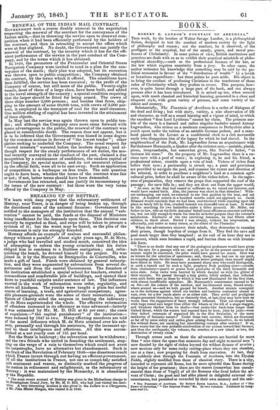BREAKING UP OF METTRAY.
Wa learn with deep regret that the reformatory settlement of Mettray, near Tours, is in danger of being broken up, through the disordered state of the national finances : Government has notified to the managers of the institution that the annual "sub- vention" cannot be paid, the funds at the disposal of Ministers being insufficient for the demands upon them. This decision can scarcely be regarded as final, and steps will be taken to procure a revision of it ; but the worst may be feared, as the plea of the Government is only too strongly founded. Mettray affords an example of zealous and successful philan-
thropy without a parallel.* About eight years ago, M. de Metz, a judge who had travelled and studied much, conceived the idea of attempting to reform the young criminals that his duties obliged him to condemn to a fruitless castigation ; and, relin- quishing the bench, he devoted himself to the project. He was
joined in it by the Marquis de Bretignolles de Courteilles, who
made a gift of land. Funds were obtained by general subscrip- tion, and they were augmented by subventions from several de- partments and from the central Government. The founders of the institution established a special school for teachers, erected a commodious and comfortable pile of buildings, and opened their doors to youthful culprits under sentence of law. The influences exerted in the work of reformation were order, regularity, and above all kindness. The youths were taught a plain but useful COMIC of learning, a trade, and agricultural occupations; agree- able pleasure-grounds were the scene of their recreations ; nine Sisters of Charity aided the surgeon in tending the infirmary; M. de Metz superintended the whole. The effective reformation of offenders increased in its efficiency as time advanced—latterly it was estimated by Mr. M. D. Hill at 85 per cent ; the cases of expulsion—" the capital punishment" of the institution— were reduced by 1847 to two. Many affecting anecdotes are told of the moral influence which M. de Metz attained over his sub- iects, personally and through his assistants, by the incessant ap- peal to their intelligence and affections. All this was accom- plished at a net yearly cost of 12/. per head.
But the State is bankrupt ; the subvention must be withdrawn ;
and the two friends who united in founding the settlement, stop- ping on the verge of a ruin to themselves which could not avert the catastrophe, have no alternative but abandonment. Such is ine fruit of the Revolution of February 1848—one disastrous result which France incurs through not having an efficient government. Of all the institutions in France, not one so complitely satisfied aith sentiment and reason, so distinctly marked the progress of be nation in refinement and enlightment, as the reformatory at Wettray : it was maintained by the Monarchy, it is abandoned 7 the Republic.
The most recent account of Mettray was given in the Michaelmas charge to he Birmingham Grand Jury, by Mr. M. D. Hill, who had jest visited the insti- !Aim. A my interesting account is also given in the Letters to a Clergyman, Y Mr. John Minter Morgan, who visited it in 1846.


























 Previous page
Previous page